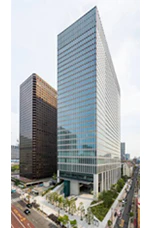Under its Responsible Investment Guidelines, Nippon Life aims both to ensure profitability and to realize a sustainable society for increasing customer returns by employing various methods instead of relying on a single approach according to the unique characteristics of different assets and regions.
Integration
Nippon Life implements "integration," a method which incorporates ESG factors in our investment and financing processes for all asset classes. Specifically, the ESG initiatives of investee companies are evaluated in an appropriate manner to their asset characteristics, and investment and finance decisions are made by incorporating these evaluations in terms of their impact on corporate value and creditworthiness into traditional analyses such as financial analysis.
When conducting ESG evaluations for investments in stocks and corporate bonds, for example, we use a well-balanced variety of information from different sources, including information obtained through engagement with companies, information from Nissay Asset Management, a group company that has been conducting ESG evaluations for more than 10 years, information disclosed in integrated reports and other documents, and information from ESG data providers.
For important issues identified through the ESG evaluations, we confirm the situation and encourage the investee to take measures through dialogue. In this way, we aim to reduce portfolio risks and improve returns through the enhancement of investees' corporate value by linking "integration" and "engagement."
Stocks
Nippon Life evaluates the ESG activities of investee companies based on factors such as information obtained from dialogue with investee companies and information from ESG ratings agencies.
Nippon Life makes investment decisions by factoring ESG evaluations into qualitative evaluations of corporate analysis based on whether they will impact the corporate value of investee companies, together with performing quantitative evaluations of earnings projections and valuations.
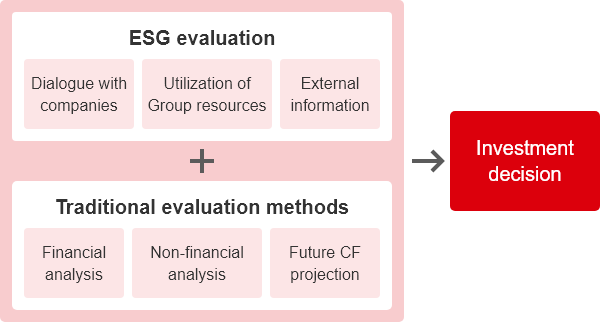
Finance
Nippon Life evaluates the ESG activities of borrower companies based on factors such as information obtained through on-site company visits of borrowers.
Nippon Life conducts credit assessments of projects by factoring ESG evaluations into qualitative evaluations of corporate analysis based on whether they will impact the creditworthiness of borrower companies, together with performing quantitative evaluations of financial analysis and other factors.
In project finance, Nippon Life will conduct credit assessments of projects considering factors such as environmental and social risks and refer to standards such as the Equator Principles. Nippon Life will also consider ESG factors in the credit assessments of individual projects, in addition to assigning internal ratings based on ESG factors.
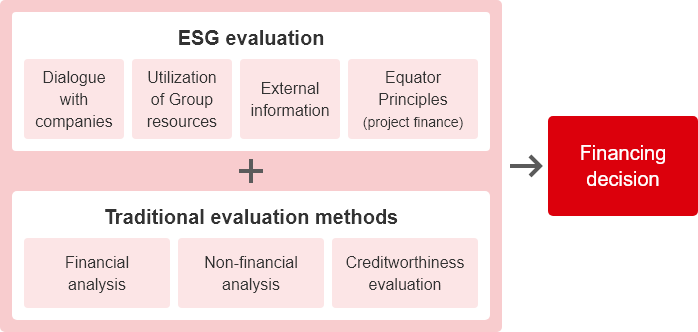
Sovereign Bonds
Nippon Life evaluates the ESG activities of investees based on international statistics, information from ESG ratings agencies, and other data.
Nippon Life makes investment decisions by factoring ESG evaluations into qualitative evaluations of the analysis of investment targets, based on whether they will impact the creditworthiness of investees, together with performing quantitative evaluations of economic and financial analyses, interest rate levels and other factors.
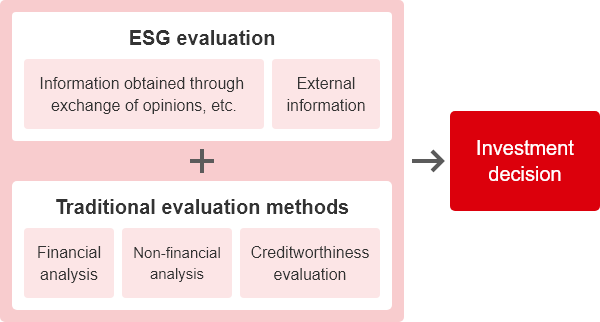
Corporate Bonds
Nippon Life evaluates the ESG activities of investee companies based on factors such as information obtained from dialogue with investee companies.
Nippon Life factors ESG evaluations into qualitative evaluations of corporate analysis based on whether they will impact the repayment ability of investees, together with performing quantitative evaluations of financial analysis, interest rate levels and other factors.
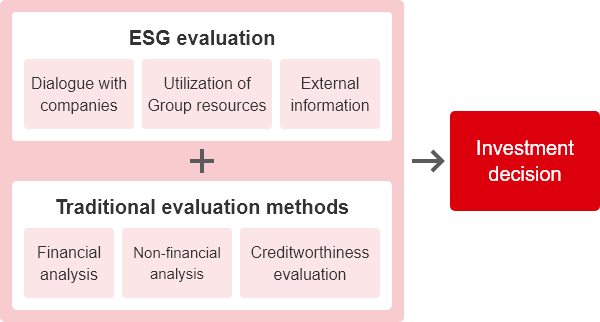
Real Estate
Nippon Life proactively acquires environmental and social certifications such as BELS* for investment property by setting environmentally friendly building standards, along with pushing ahead with the introduction of equipment to conserve energy and reduce CO2 emissions.
-
*
Based on the guidelines by the Ministry of Land, Infrastructure, Transport and Tourism and abbreviated as Building-Housing Energy-efficiency Labeling System, third-party organizations objectively evaluate the energy-efficiency performance of buildings and it is displayed in five grades.
In the process of selecting real estate contractors, Nippon Life will confirm the status of their environmental and social activities in construction work and the procurement of materials.

-
*
With regard to indirect investment, we confirm external managers' policies on ESG and the status of activities such as integration, while considering investment strategies and asset characteristics. We take these factors into account when making investment decisions.
Negative Screening
In light of the mission and public nature of the life insurance business, Nippon Life prohibits investing in and financing companies that manufacture cluster munitions, biological weapons, anti-personnel landmines, chemical weapons and nuclear weapons. We also prohibit investing in palm oil-related companies* and tobacco-related companies from the perspective of strengthening our response to important social challenges.
In addition, there has been rapidly growing international interest in climate change in response to initiatives such as the SDGs and Paris Agreement adopted by the United Nations. With this in mind, Nippon Life has embraced a policy, not to engage in new investment and financing in coal-related projects (excluding brownfield projects aligned with 1.5℃ pathways), and oil and gas-related projects which are 1) greenfield exploration projects and 2) related projects except resource explorations (excluding gas-related projects aligned with 1.5℃ pathways)
-
*
Excluding companies which are 100% RSPO certified
Positive Screening
In positive screening, we decide to invest in companies based on their practices like producing environmentally friendly products or contributing to the development of local communities. This approach differs from negative screening, where companies are excluded as investee companies.
We have implemented allocation rules across assets, where ESG ratings are used as a criterion, specifically focusing on the proportion of holdings with high ESG ratings. In this way, we prioritize funding to investee companies with excellent ESG initiatives. For investee companies where we believe there is room for improvement in ESG initiatives, we encourage their initiatives through dialogue and other means.
Thematic Investment
The 2015 United Nations Summit adopted the Sustainable Development Goals (SDGs) as international goals to solve global social issues and realize a sustainable world, and 17 goals and 169 targets were set with 2030 as the deadline for their achievement. Companies around the world are integrating the SDGs into their management and working toward common goals to be achieved by 2030. In our asset management activities, we aim to help bring about sustainable societies by supporting corporate initiatives through funding and other means.
Under these circumstances, we have set a target of 5 trillion yen for Thematic Investment (FY 2017-2030) where the use of funds is linked to SDG-themes. As of the end of March 2025, the cumulative amount of Thematic Investment has exceeded 3.3 trillion yen.
Decarbonization Financing Facility
For supporting decarbonization efforts by society as a whole and companies, this facility is an investment target (3 trillion yen in FY2017 to 2030) covering green bonds, transition finance, etc.
Nissay Impact Investing Facility
This facility is an investment target (500 billion yen in FY2024 to 2030) to create sustainability outcomes more actively by requiring our approach to focus on dialogue in addition to a generally recognized definition of impact investment.

Progress on the 5 trillion yen target in Thematic Investment
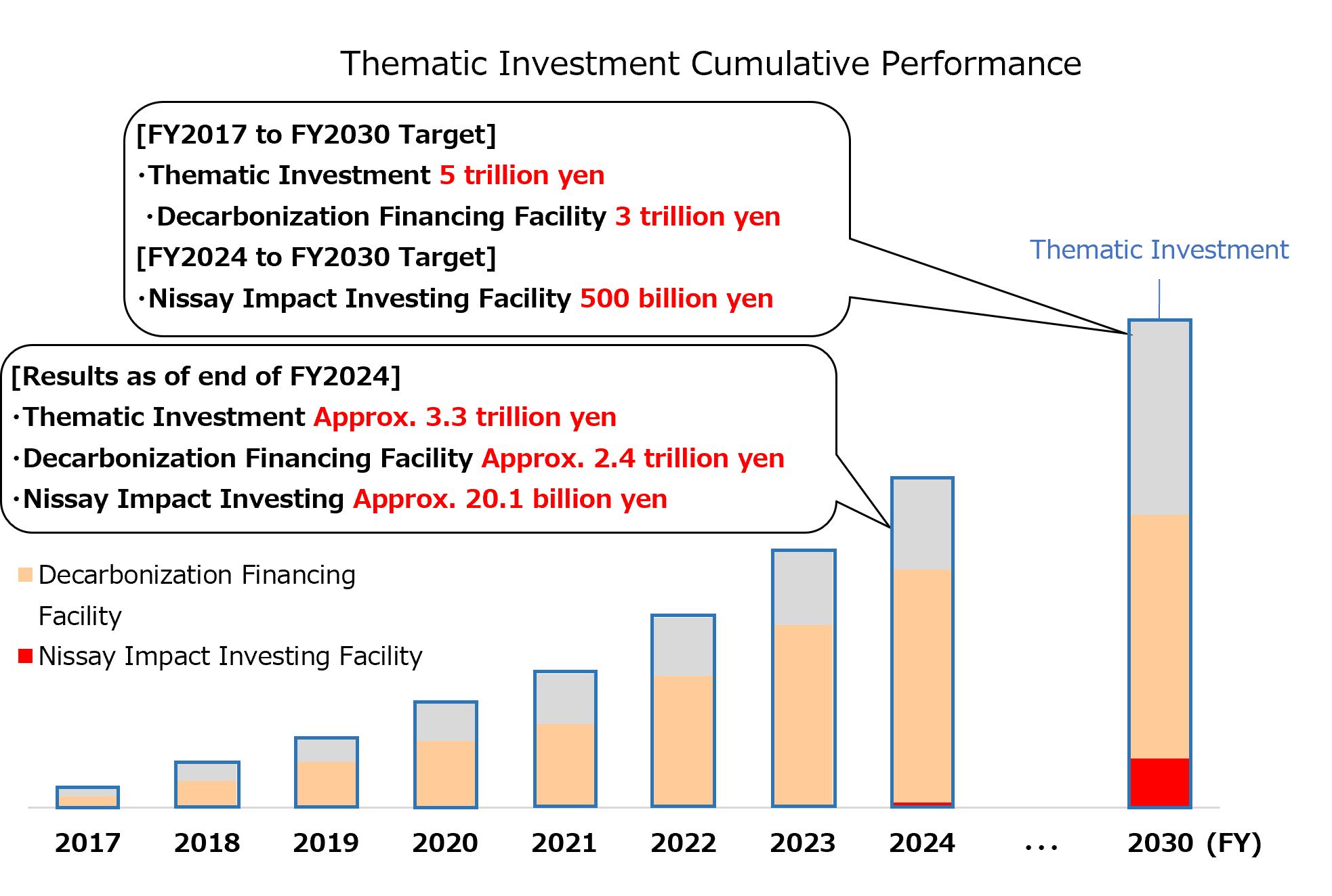
-
*
There may be some cases in which both Decarbonization Financing Facility and Nissay Impact Investing Facility are applicable to a project.
Examples of outcomes shaped through Thematic Investment
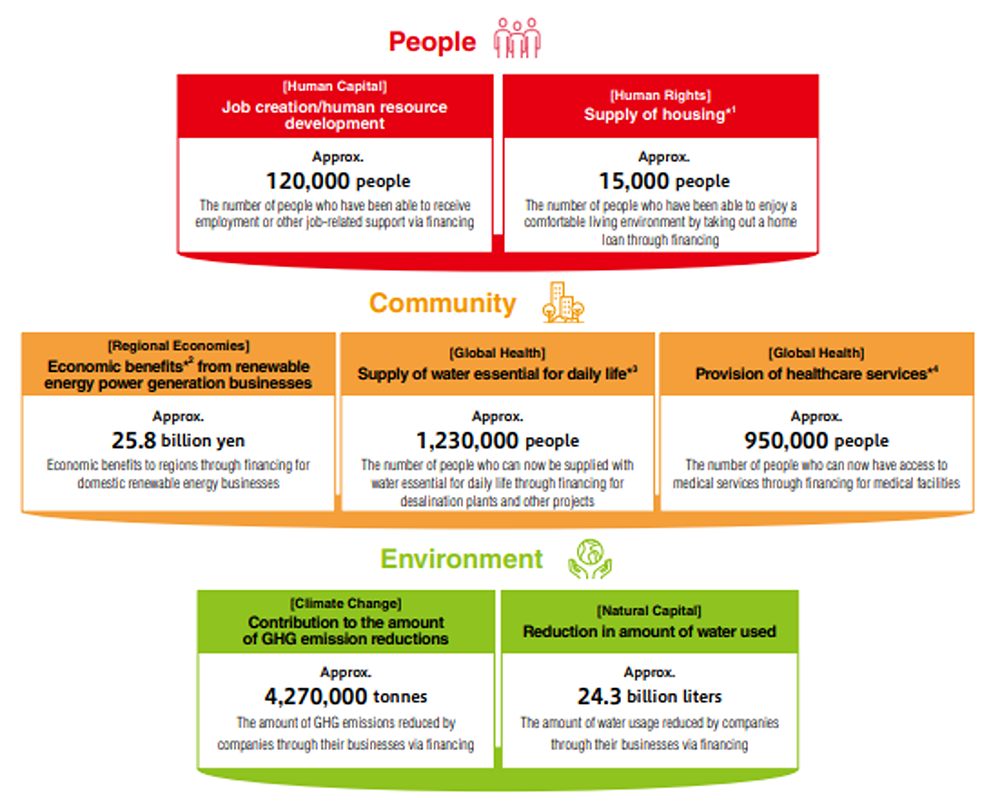
"Outcomes" means results or effects that indicate the creation of positive impacts or the reduction of negative impacts on the real world. They are also known as sustainability outcomes. Outcomes shaped by Nippon Life are calculated based on information provided by investee and borrower companies, taking into account our share of the investment and finance amount.
-
*1
The number of people supplied with housing is calculated based on a two-person household if the number of households is disclosed.
-
*2
Economic benefits refer to benefits simulated using the Ministry of the Environment’s Regional Economic Ripple Effect Analysis Tool Ver. 6.0.
-
*3
The number of people supplied with water is calculated on an annualized basis as the capacity of desalination plants and other projects to supply household water divided by the average global annual water usage (per person).
-
*4
The number of people supplied with medical services is calculated as the annualized number of patients per day.
-
*5
Includes water savings from wastewater treatment and similar measures
Stewardship Activities
As an institutional investor that makes long-term investments, Nippon Life conducts constructive dialogue with investee companies in its stock and bond portfolio as part of its stewardship activities. By doing so, Nippon Life encourages medium- to long-term improvement in corporate value and seeks to derive benefits in the form of shareholder returns, stock price appreciation and stable repayment of principal and interest on corporate bonds, thereby paving the way for growth in investment returns, along with aiming to realize a "safe, secure and sustainable society." In addition, to support the growth of sustainable companies even more than before, Nippon Life is promoting dialogue activities focused on the core theme of ESG.
We have placed emphasis on governance (G) in dialogue with investee companies, along with shareholder returns and profitability since before the establishment of the Japan's Stewardship Code in fiscal 2013. In addition, as companies and investors become more aware of the themes of the environment (E) and society (S), we have enhanced dialogue on themes related to the E and S from fiscal 2017, and have gradually expanded important themes for dialogue from the perspective of enhancing corporate value.
When deciding whether to vote for or against proposals, Nippon Life does not make sweeping decisions based on quantitative standards, but rather engages in dialogue to make detailed judgments based on factors such as its understanding of the individual status of each company and its initiatives for improvement.
In bond investments, Nippon Life conducts dialogue focused on the theme of ESG issues. In addition, Nippon Life encourages issuers to issue ESG bonds and so forth to spur the creation of investment opportunities.
Other
CSR Loans
Nippon Life supports CSR loans by offering preferential interest rates for loans to individuals that are engaging in activities that take into consideration the global environment.
Environmentally Considerate Real Estate Investment
Nippon Life actively installs facilities for limiting CO2 emissions when new buildings are constructed or building facilities are upgraded. In fiscal 2014, NIPPON LIFE MARUNOUCHI GARDEN TOWER received DBJ Green Building Certification "Five Stars*" as a real estate property with high environmental and social awareness. In fiscal 2015, the building acquired LEED-CS Certification* "Gold".
-
*
DBJ Green Building Certification "Five Stars" is a certification system for real estate showing consideration for the environment and society and carried out by the Development Bank of Japan and Japan Real Estate Institute. "Five Stars" is the highest rank in the five stages of certification.
-
*
"LEED-CS Certification" refers to the Core & Shell Division of Leadership in Energy & Environmental Design (LEED), one of the most popular environmental indicators in the world. LEED is sponsored by the U.S. Green Building Council, and tenant buildings are under this category.
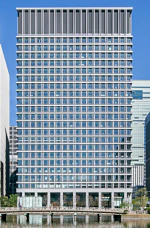
Real Estate Investment Reflecting Health and Safety Considerations
Nippon Life Hamamatsucho Crea Tower has earned the WELL Health-Safety Rating*, a global health and safety rating. It marks the first WELL Health-Safety Rating earned by an insurance company in the world.
-
*
WELL Health-Safety Rating is a new rating unveiled in June 2020 by the International WELL Building Institute (IWBI) of the U.S. The rating evaluates how well a property is operated and managed in consideration of the health and safety of staff and individuals who use the facilities.
